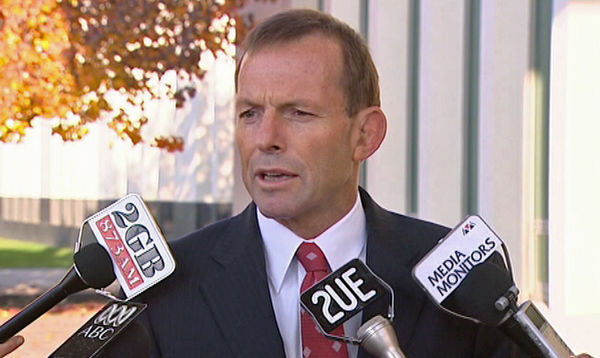Politics is re-shaping the climate question to suit its own needs. [8 March 2011 | Peter Boyer]
There’s reality, and there’s politics, and for all our efforts to bring them together, they remain utterly, obstinately separate. The carbon tax debate is a case in point.
Tony Abbott’s assault on the tax last week featured two front-benchers, Sophie Mirabella and Eric Abetz, comparing Julia Gillard with the mad Colonel Gaddafi of Libya. Like him, they said, she was deluded to think Australians would accept a carbon tax.
They might have used a mirror. “Deluded” isn’t a bad description of their own state of mind — or that of their leader — in the lead-up to the most significant policy debate of this century.
With each passing year the science across every relevant discipline has produced ever-stronger evidence for human-induced warming — evidence that even arch-sceptic Tony Abbott finds he can no longer ignore.
The challenge presented by humanity’s rising carbon emissions can be compared with imminent war or economic collapse — except that it’s bigger than either. This is not a matter for party games. Faced with such a challenge, the responsible political action is cross-party cooperation.
Not a bit of it. Abbott’s “people’s revolt” looks uncomfortably similar to America’s extreme-right Tea Party movement, which specialises in misinformation and personal attacks. A nasty anonymous telephone call to independent MP Tony Windsor was an indication of where this might lead.
In some respects Gillard has been her own worst enemy. Poorly-informed and boxed into a corner in last August’s election campaign, she found herself saying that she would not introduce a carbon tax — words that were manna from heaven for the opposition.
Back then, Gillard thought emissions trading, not tax, was the way to go. What she said wasn’t a lie, but it was a big mistake. Given the urgency and complexity of the task at hand, she should never have ruled out a direct tax, at least as an interim measure until emissions trading got under way.
Nor should Abbott have demanded this. His personal behaviour throughout this debate shows an undue focus on short-term political gain at the expense of the larger good and his party’s longer-term benefit. This shallow, opportunistic campaign will win him no plaudits in the history books.
Politicians on both sides of the house will always focus on the next election, because past experience shows that it’s not the long view that wins votes but the ability to seize the moment, to catch people’s attention with simple catchphrases.
But the climate-energy debate doesn’t lend itself to simple solutions. It’s complex, in many respects counter-intuitive, and has big long-term implications. It demands that we make some changes in the way we think and do things, and requires everyone to make some sacrifice.
This has pushed many people to seek an alternative view of things. Faced with evidence that their present well-being is unsustainable, they reject any possibility of changing and look for counter-evidence to support business-as-usual.
It’s a natural reaction, and as any serious observer of the climate dilemma knows, it’s a trap. Abbott would deny that he’s encouraging people to wish the evidence away, but his actions say otherwise. This is poor leadership, but it’s what we’ve come to expect in this debased political climate.
Abbott touts “direct action” like tree planting or soil sequestration as the best way to cut emissions. Measures like these will be needed as an adjunct to a tax, but economists agree that by themselves they are far more costly than tax per tonne of carbon saved. His claim that his anti-tax campaign will save us money is simply unsustainable.
Playing politics isn’t the exclusive domain of politicians. There’s a fair bit of it out in the business community, whose well-known dislike of uncertainty (as if it’s possible to be certain about the future!) was highlighted by Gillard last week.
The Prime Minister argues that business will support her tax proposal because it offers a stable business environment, but no such support was evident from our most carbon-intensive industries. BlueScope Steel CEO Paul O’Malley didn’t hold back, saying the tax proposal would amount to economic vandalism unless businesses like his were adequately compensated.
O’Malley may just be making an ambit claim ahead of negotiations over the fine detail of the tax. There will be assistance for EITE (“emissions-intensive, trade-exposed”) industry, but it’s unlikely to be enough to stop the complaining from BlueScope or its main competitor, OneSteel.
And then there’s international politics, which give a whole new meaning to the term “obfuscation”. UN climate outcomes have always been prey to the interests of nations or interest groups, which tend to use them, ignore them or reinterpret them to suit current purposes. Land use is a classic example, about which more in a coming column.
• At the Stanley Burbury Theatre, University of Tasmania, Sandy Bay, starting at 6.00 pm on Thursday 10 March, Professor Ross Garnaut will talk about “The science of climate change” in the fifth of a series of eight papers updating his 2008 Climate Change Review, being delivered around Australia from January to March.

